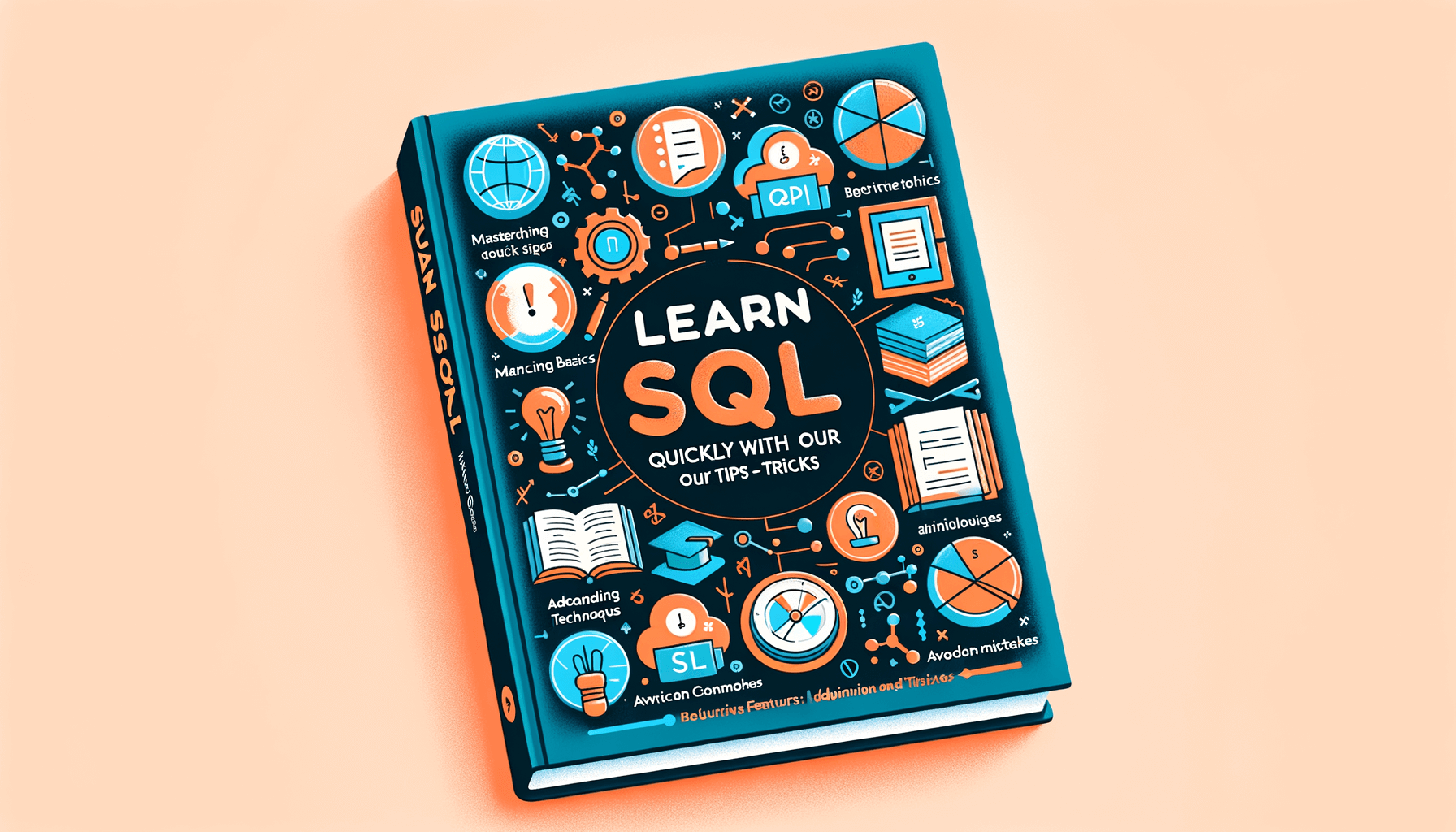A big variety of articles and resources

Is SQL Difficult to Learn? Overcoming Common Challenges
 Sia Author and Instructor
Learn SQL
Sia Author and Instructor
Learn SQL
9 minute read
Learning SQL can seem hard at first, but it's a useful skill in today's data-driven world. SQL, or Structured Query Language, helps you talk to databases. As you learn, you might face some common challenges, but there are ways to overcome them. This article will guide you through the basics, common problems, and how to get better at SQL.
Key Takeaways
- SQL is a key skill for managing and analyzing data.
- Beginners often struggle with complex queries and large datasets.
- Practice and real-world projects can help you learn SQL faster.
- Joining communities and forums can offer support and resources.
- SQL is important in many fields, like business intelligence and software development.
Understanding the Basics of SQL
Fundamental Concepts and Syntax
When we start learning SQL, we first need to understand its basic concepts and syntax. SQL, or Structured Query Language, is used to communicate with databases. It allows us to create, read, update, and delete data. The syntax of SQL is straightforward, but it requires practice to master. We use commands like SELECT, INSERT, UPDATE, and DELETE to manage data.
Importance of Relational Databases
Relational databases are essential because they store data in a structured way. This structure makes it easy to retrieve and manipulate data. In a relational database, data is organized into tables, which are made up of rows and columns. Each table represents a different entity, and the relationships between these tables help us understand how the data is connected.
Commonly Used SQL Commands
There are several SQL commands that we use frequently. Here are some of the most common ones:
- SELECT: Retrieves data from a database.
- INSERT: Adds new data to a database.
- UPDATE: Modifies existing data in a database.
- DELETE: Removes data from a database.
These commands form the foundation of SQL and are essential for anyone looking to work with databases.
Common Challenges Faced by SQL Learners
Complexity of Query Language
Learning SQL can be tough because the query language itself is quite complex. Many beginners struggle with understanding the syntax and structure of SQL commands. Mastering the basics is essential, but it can be overwhelming at first.
Understanding Joins and Subqueries
Joins and subqueries are two of the most challenging concepts for SQL learners. These are advanced topics that require a solid understanding of how tables relate to each other. Without this knowledge, it can be difficult to write efficient queries.
Dealing with Large Datasets
Handling large datasets is another common challenge. When working with big data, performance issues can arise, making it hard to retrieve information quickly. Learners need to understand how to optimize their queries to manage these large datasets effectively.
sqlskillz.com offers the sqlmicro essentials course for it students and professionals. Gain practical skills, real-world experience, and expert-led training for career advancement in data management.
Effective Strategies for Learning SQL
Utilizing Online Resources and Tutorials
One of the best ways to learn SQL is by using online resources and tutorials. There are many free and paid courses available that can help you get started. For example, a data analyst - introduction to SQL course offers hands-on SQL training with industry insights. These courses often include video lessons, quizzes, and practical exercises to reinforce your learning.
Hands-On Practice and Real-World Projects
To truly understand SQL, you need to practice writing queries and working on real-world projects. This could involve creating your own database or working with existing datasets. The more you practice, the more comfortable you will become with the syntax and structure of SQL.
Joining SQL Communities and Forums
Another effective strategy is to join SQL communities and forums. These platforms allow you to connect with other learners and experienced professionals. You can ask questions, share your knowledge, and learn from others' experiences. Being part of a community can provide you with support and motivation as you progress in your SQL learning journey.
Remember, learning SQL is a journey, not a destination. Stay curious and keep practicing to improve your skills.
The Role of SQL in Modern Data Management
SQL in Business Intelligence and Analytics
In today's data-driven world, SQL plays a crucial role in business intelligence and analytics. It allows us to extract valuable insights from large datasets, helping businesses make informed decisions. By mastering SQL, we can craft complex queries that retrieve specific data, enabling detailed analysis and reporting. This skill is essential for anyone looking to advance their career in data analysis or marketing.
Integration with Other Programming Languages
SQL's versatility is evident in its ability to integrate with various programming languages. This integration allows us to build more dynamic and interactive applications. For instance, combining SQL with Python or JavaScript can enhance data processing capabilities, making it easier to manage and manipulate data. This seamless integration is a key reason why SQL remains a popular choice among developers.
Future Trends in SQL Development
As technology evolves, so does SQL. We are seeing trends like the rise of cloud-based databases and the incorporation of machine learning algorithms into SQL queries. These advancements are making SQL even more powerful and versatile. Staying updated with these trends is crucial for anyone involved in data management, as it ensures we remain competitive in the field.
Understanding the role of SQL in modern data management is essential for leveraging its full potential. By keeping up with the latest trends and continuously improving our skills, we can effectively manage and analyze data, driving better business outcomes.
Comparing SQL with Other Query Languages
Differences Between SQL and NoSQL
When we compare SQL and NoSQL, we see that they serve different purposes. SQL is great for structured data and follows a table-based format. On the other hand, NoSQL is more flexible and can handle unstructured data. This makes NoSQL a good choice for big data applications.
Advantages and Disadvantages of SQL
SQL has many advantages, such as its ability to handle complex queries and its strong support for transactions. However, it also has some downsides. For example, SQL databases can be hard to scale horizontally. Here is a quick look at the pros and cons:
| Advantages | Disadvantages |
|---|---|
| Strong support for transactions | Hard to scale horizontally |
| Handles complex queries well | Can be slower with large datasets |
| Widely used and supported | Requires a fixed schema |
Use Cases for SQL and NoSQL
SQL is often used in applications where data integrity is crucial, like banking systems. NoSQL, however, is used in scenarios where speed and scalability are more important, such as social media platforms.
Understanding the strengths and weaknesses of both SQL and NoSQL can help us choose the right tool for the job. This way, we can make sure our data is managed in the best way possible.
Overcoming the Learning Curve in SQL
Setting Realistic Learning Goals
When starting with SQL, it's important to set achievable goals. Begin with the basics and gradually move to more complex topics. This approach helps in building a strong foundation and prevents feeling overwhelmed.
Seeking Help from Mentors and Peers
Learning SQL can be challenging, but seeking help from mentors and peers can make a big difference. Join study groups or online forums where you can ask questions and share knowledge. Collaborating with others can provide new insights and make learning more enjoyable.
Continuous Learning and Skill Improvement
SQL is a vast field, and continuous learning is key to mastering it. Regularly practice writing queries and stay updated with the latest trends and best practices. Remember, persistence is crucial in overcoming the learning curve.
The journey of learning SQL is ongoing. Embrace the process and celebrate small victories along the way.
Practical Applications of SQL Skills
Database Administration and Management
In the world of database administration, SQL is a must-have skill. We use it to manage and organize data, ensuring everything runs smoothly. From setting up databases to maintaining them, SQL helps us keep data safe and accessible. Learning SQL can open doors to roles like PostgreSQL Junior DBA, where we handle real-world problems and hands-on projects.
Data Analysis and Reporting
SQL is also key in data analysis. We can pull out important information from large datasets, helping businesses make smart decisions. By writing queries, we can find trends, patterns, and insights that are hidden in the data. This makes SQL a powerful tool for anyone looking to work in business intelligence or analytics.
Software Development and Engineering
For software developers, SQL is often used to interact with databases. Whether we're building web apps or mobile apps, knowing SQL allows us to store and retrieve data efficiently. This skill is crucial for creating applications that rely on data, making our work more effective and streamlined.
Mastering SQL not only boosts our technical skills but also enhances our problem-solving abilities, making us more valuable in the tech industry.
Learning SQL can open many doors for you. From managing databases to analyzing data, the skills you gain are invaluable. Want to take your SQL knowledge to the next level? Check out our courses and see how we can help you achieve your goals!
Conclusion
Learning SQL might seem hard at first, but with practice, it becomes easier. Many people face common problems, but these can be solved with patience and the right help. By breaking down the learning process into small steps, anyone can master SQL. Remember, every expert was once a beginner. So, keep practicing, ask for help when needed, and don't give up. With time and effort, you will find that SQL is not as hard as it seems.
Frequently Asked Questions
Is SQL hard to learn for beginners?
SQL can be a bit tricky at first, but with practice, most people get the hang of it. Start with the basics and build your skills step by step.
What are the basic commands I should learn first?
Begin with basic commands like SELECT, INSERT, UPDATE, and DELETE. These will help you perform most of the common tasks in SQL.
Why is understanding joins so difficult?
Joins can be confusing because they involve combining data from multiple tables. It helps to visualize how tables are related to each other.
How can I practice SQL effectively?
Use online resources, work on real-world projects, and join SQL forums or communities. Hands-on practice is key to becoming good at SQL.
What is the role of SQL in data analysis?
SQL is used to query and manage data in databases, making it essential for data analysis. It helps you retrieve and manipulate data to find useful information.
Are there any good online resources for learning SQL?
Yes, there are many online tutorials, courses, and forums where you can learn SQL. Websites like Khan Academy, Codecademy, and Coursera offer excellent resources.
Related Articles

Can I learn SQL fast enough to get a job next week using it?
12 minute read

Discover the Best Website to Learn SQL in 2023
9 minute read





